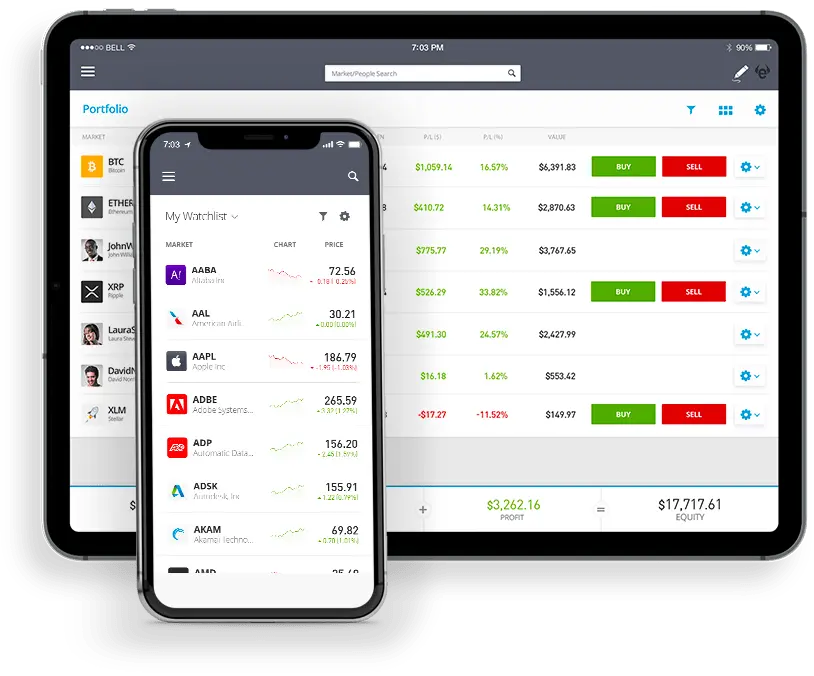
eToro charges two main types of fees for trading the Nasdaq 100 index: spreads and overnight/weekend fees. The spread is the difference between the buy and sell prices, which varies based on market conditions. If you hold a position overnight or over the weekend, you'll incur additional overnight or weekend fees, respectively.
61% of retail investor accounts lose money when trading CFDs with this provider. You should consider whether you can afford to take the high risk of losing your money.
Given that I have placed buy and sell orders on the Nasdaq 100 index (NSDQ100) with eToro on several occassions, it has equipped me with a detailed understanding of the fees and commissions involved. This article is designed to share these insights, assisting you in comprehending the potential costs associated with trading the NSDQ100 index on this platform. Keep reading to know the details!
It's crucial to recognize that when you trade the NSDQ100 index on this platform, you're actually dealing with Nasdaq 100 index CFDs (Contracts for Difference). This form of trading, which includes leveraged trading and short selling without owning the actual assets, comes with its own set of costs, including spreads and overnight fees.
Spreads, the difference between the Buy and Sell prices of the Nasdaq 100 index, are a primary cost component of this broker. These fees are incurred when you close your position. Be mindful that spreads are subject to market conditions and can vary.
The minimum spread for the eToro Nasdaq-100 index is set at 2.4 points, where "points" indicate price changes to the left of the decimal. For example, a move from $17027 to $17150 in the NSDQ100 represents a 123-point change. Remember, these spreads are variable and may shift according to market trends.
Holding a CFD position on the Nasdaq 100 index overnight results in a fee relative to the value of your position, similar to an interest charge for the leverage used. Also, positions kept open over the weekend incur Weekend Fees, typically triple the standard overnight fee.
Rollover fees are subject to fluctuations in global market conditions. As of my last review, the rollover fee for NSDQ100 was $0.59181028 for Sell (Short) positions and $-3.67161932 for Buy (Long) positions, charged per unit each night. These rates change frequently, so consulting eToro's latest fee schedules is recommended for the most accurate information. You can also find these fees on the NSDQ100 asset page in the trading window, just below the "Open Trade" or "Set Order" button.
When trading the Nasdaq 100 or NSDQ100 CFD index on eToro, you primarily encounter two types of fees: spreads, which are the differences between buy and sell prices, and overnight/weekend fees for positions held beyond a single day.
It's crucial to remember that these fees can vary, so regularly checking eToro's website for the latest fee structure is recommended to stay informed. This guide has been created to give some insights on the fee landscape associated with investing in this index via this platform, helping you navigate your trading journey with greater clarity.
eToro is a multi-asset platform which offers both investing in stocks and cryptoassets, as well as trading CFDs.
Please note that CFDs are complex instruments and come with a high risk of losing money rapidly due to leverage. 61% of retail investor accounts lose money when trading CFDs with this provider. You should consider whether you understand how CFDs work, and whether you can afford to take the high risk of losing your money.
This communication is intended for information and educational purposes only and should not be considered investment advice or investment recommendation. Past performance is not an indication of future results.
Copy Trading does not amount to investment advice. The value of your investments may go up or down. Your capital is at risk.
Don’t invest unless you’re prepared to lose all the money you invest. This is a high-risk investment and you should not expect to be protected if something goes wrong. Take 2 mins to learn more.
Crypto investments are risky and may not suit retail investors; you could lose your entire investment. Understand the risks here https://etoro.tw/3PI44nZ.
eToro USA LLC does not offer CFDs and makes no representation and assumes no liability as to the accuracy or completeness of the content of this publication, which has been prepared by our partner utilizing publicly available non-entity specific information about eToro.
 About Nadav Zelver
About Nadav Zelver